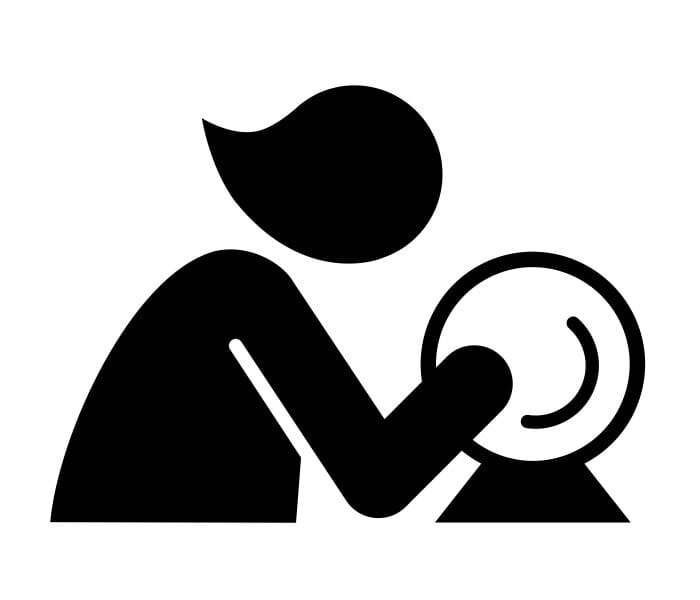Why You Shouldn't Believe in Astrology, Part 6
Astrology made me extremely uncomfortable, as it was so difficult to refute: I was not so much afraid that astrology will be wrong but that it will be right. Or worse, just right enough to capture my irrational mind and make me lose control of my thinking - or of my finances.

As a skeptic myself, I love probing my own motivations for disbelieving astrology. And after years of soul searching, one component came up repeatedly. It made me extremely uncomfortable, as it was so difficult to refute:
I was not so much afraid that astrology will be wrong but that it will be right. Or worse, just right enough to capture my irrational mind and make me lose control of my thinking - or of my finances.
After all, what if someone lures you in with just a bit of truth and then leads you along for years draining you of all of you money or ability to manage your own life? Let alone that psychiatrists and many medical doctors do this all the time, the fear of getting hoodwinked is real and valid. Partially for the hurt pride but largely for the potential real world consequences of loss, madness, and ruin.
Astrologically, we discuss this phenomenon in terms of the planet Neptune and the sign of Pisces which it rules. Humans have an innate desire, indeed a need, to connect with the “mystical.” And in astrology, this longing is described by the planet Neptune.
The difficulty with Neptune is that you can never be 100% sure if the mystical experience you just had was “real” or just your imagination - or worse, if it was some sort of elaborate hoax. That sort of uncertainty is built into the Neptunian experience, and indeed with out that “blurring” of reality, you couldn’t have any such experiences in the first place - real or imagined.
The way most people deal with this problem of understanding is to shut off the concept of mysticism completely and hew religiously to the rational, controllable functions. This way, they assure themselves, they will never become victimized by charlatans and mystics.
"Nobody believes in God like an atheist.” - Alan Watts
Unfortunately, because this longing for some sort of transcendence never goes away, but rather becomes unconscious when we try to suppress it, it winds up almost guaranteeing that we will fall prey to some of Neptune’s machinations.
The Ancient Greek play “The Bacchae” is a wonderful illustration of this phenomenon, as it descibes the gradual death and undoing of the good and rational king Pentheus. As Pentheus encounters the mystical (and drunken!) god, Dionysos entering his city and demanding to be worshipped, Pentheus responds in the proper, rational way: Get off my lawn!
I won’t give away the ending, but eventually the tension between reason and madness ends with Pentheus’s own mother going insane (mid-orgy), mistaking him for a lions and tearing him limb from limb. Ok, so I did give away the ending.
(For a more contemporary version of this, we recommend the wonderful film “Claire’s Knee” by Eric Rohmer. The god of Ecstasy isn’t always required to undo a man. Sometimes a pretty girl can do it just as easily.)
People who are obsessively rational because they are terrified of the unconscious - and let’s face it, there are plenty of good reasons to be terrified of the unconscious - are paradoxically the most susceptible to being overtaken by the unconscious. This can happen through outright scams, or, just as often, through substance addiction, which gives a sort of mock experience of the divine where we let go of our ego temporarily and experience “mild” insanity, rather than the full blown insanity we fear we risk if we fully give in to the unconscious.
But as with most astrological teachings, the truth is paradoxical. The truth is the more you embrace the unconscious, mysticism, and the divine, the more say you have over how it impacts your life.
For example, you may hate your ex wife, but if you shut her out of your life completely, God only knows what sort of havoc she will wreak behind the scenes. But if you allow yourself at least a modicum of connection, you can “keep ypour enemies closer,” and have some say as to how she influences your life.
That’s a crude example, but this is the truth about all of our relationships. When we cut something out of our pyche, it doesn’t just disappear. It simply acts autonomously and unconsciously - which is usually more damaging than if we develop the strength to face and relate to it directly.
And in astrology we learn that mysticism is only really a small part of the chart. In studying astrology, you are able to see a framework where you can connect to and appreciate the irrational sides of life without succumbing to them completely. In fact this is one of the great benefits of our practice that it allows you to experience the mystical without the risk of being completely taken in because you now have an intellectual framework that allows for both the irrational and the rational in the totality of the human experience.
But the lesson from The Bacchae is essential. Irrationality is part of life, and we repress it at our peril.
Ask yourself, if I told you the sky was green with pink polka dots, would you have a strong emotional reaction against such an inane proposition? No, you’d look at me funny and basically laugh it off. But astrology tends to evoke much stronger reactions in people. They need to actively scorn and scoff at it, which belies a sense that it actually as some “purchase” in their psyche after all, but they don’t yet know how to deal with it.
As is the case for many such ailments, the disease is the cure itself. By approaching astrology cautiously and intelligently, you may actually find that appreciating the proper place of the mystical - and even the unexplainable - in your life, you are able to be free from its control, and your rational functions will perform much more securely since the anxiety of them being constantly undermined is reduced.
Again this is the paradoxical nature of our teaching and is a much more valuable component of astrology than “predicting one’s future,” which is something serious astrologers don’t even attempt to do. A good astrologer will give you more usable information about yourself to help you make better choices. They will not trap you in deterministic boxes.
Most people are afraid of astrology not because they are afraid that it won’t work, but because they are afraid that it will work. There are things we all don’t want to know about ourselves, and because we have deliberately underdeveloped our intuitive functions, we are often terrified that some “seer” will reveal these things to us and upend our lives, or that we will lose control of our lives completely.
That fear itself is irrational. It is a function of the fear we have of the irrational in ourselves when we have not learned how to relate to it. It’s like fearing entering the batter’s box because we never learned how to hit a baseball. It’s simply a missing skill that most of us have never been trained in, and which therefore causes us outsized anxiety.
Once you have a good reading, you will feel energized and empowered, not caught or anxious. We will name the anxieties and problems and give you tools to work through them and make the most of them. We won’t blow sunshine up your ass, and we will alert you to risky or complex situations when we see them. But we won’t tie you down to one life experience. You have free will, and even the act of learning about your chart will open up more freedom of choice in your life, not less.
And on the other hand, shutting out any encounter with the irrational will do the opposite and will constrict your choices. This is because your unconscious, when you are unrelated to it, will tend to act autonomously and against your conscious will.
The psyche is whole, and when we reject parts of it, they do not “disappear.” They simply operate without our conscious inputs. (This is why, for example, “Cancel Culture” is so dangerous - unfriending people does not make them disappear. It just means that you will have no idea what they are up to or why - which is far more dangerous than tolerating them and attempting to relate to them.)
Astrology gives us a framework for understanding this in a way that the rational mind can accept. It does full honor and appreciation to the importance, indeed the essential nature of the rational, linear processes in life. Without these, we would be living in caves and no better than animals.
But it also shows a picture of life that is bigger than *just* the rational. And in doing so, we grow our life experience and become less afraid of what we don’t understand, seeing that there is a place and an order for everything we experience in life.
Even beyond learning about your own particular chart, this is one of the greatest gifts that astrology offers: a meta-framework for understanding the fullness of life beyond what our own particular blinders allow us to see.
Astrology shows us not only that we all have blinders, but what those blinders are and how they support or collide with the blinders of others. Some people are born mystics. Some people are born skeptics. You can not have one without the other. And in the totality of life, the dreamers are just as essential as the pragmatists. Through the lens of astrology we learn to appreciate both as well as the many shades in between that make up the richness, complexity, and, dare I say, magic of the life we all live.

